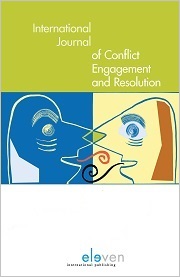|
The field of conflict resolution has developed enough to become diverse and rich with perspectives, yet the common ground between those perspectives – a permanent core essence – has not yet been defined. The use of identity theory, specifically intergroup identity theory, may be the most effective method to understand the field’s foundations. In this article, six possible group identity claims – or grand narratives – are offered. Together, they may form a foundational code for the field, which may be examined and proved in context. Defining the profession of conflict resolution also requires engagement and dialogue with other related professions. In addition to mapping the six grand narratives, this article will suggest how these narratives can at times generate differences with other academic disciplines that deal with conflicts. |


International Journal of Conflict Engagement and Resolution
About this journalSubscribe to the email alerts for this journal here to receive notifications when a new issue is at your disposal.
| Editorial |
|
| Authors | Michal Alberstein and Jay Rothman |
| Author's information |
| Article |
|
| Keywords | conflict resolution, identity, group identity, constructive engagement, narratives |
| Authors | Michal Alberstein |
| AbstractAuthor's information |
| Article |
|
| Keywords | peace and conflict research, culture, peacebuilding, democracy, truth speaking |
| Authors | Tarja Väyrynen |
| AbstractAuthor's information |
|
The article re-theorizes peacebuilding through the critique of the universalizing tendencies prominent in peace and conflict research. The critique is targeted both at the medical analogy and liberal peace theory which epitomize universalism in their own ways. By presenting a case study on a seemingly insignificant, minor and mundane event and person, a Finnish woman Kaisu, the article seeks to demonstrate the usefulness of cultural understanding of peacebuilding and the ethnographic fieldwork methods which open up interesting research questions for the research field. It is shown how peacebuilding is about politics that is ‘not yet’. During peacebuilding society needs to face its troubled past with its full complexity and create a space for constant struggle that does not seek consensus, but rather engages the society in agonistic politics and democracy. Ultimately, the article suggests that the agency of parrhestiastes, truth-speaker, opens up a necessary space for post-conflict peacebuilding as it reveals the fragmented nature of the national self. |
| Article |
|
| Keywords | peacebuilding field, culture and conflict resolution, power and conflict resolution, future trends in peacebuilding, critique of peacebuilding |
| Authors | Mohammed Abu-Nimer |
| AbstractAuthor's information |
|
Compared with other disciplines in the social sciences, conflict resolution is a relatively new, emerging professional and academic field. Many developments have shaped the current reality and boundaries of the field. This article is an attempt to provide a set of reflections on the major issues, challenges and possible future directions facing the field of conflict resolution. By narrating my own personal and professional journey, I hope to capture certain aspects and perspectives of this field. This is not a comprehensive review or ‘scientific’ charting of the field, nevertheless it attempts to shed light on areas and concepts that are otherwise taken for granted or neglected when the mapping of the field is done through more extensive empirical research. This mapping of conflict resolution after 30 years of practice, teaching and research first involves reflections on the conceptual or so-called theoretical groundings of the field. Second, it examines the various professional practices that have branched out through the last few decades. Third, it identifies some of the current limitations and challenges facing conflict resolution practitioners and scholars in their struggle to position the field in relation to current global realities. The final section discusses possible future directions to address existing gaps and refocus the research agenda of the field. |
| Article |
|
| Authors | Andrea Kupfer Schneider |
| AbstractAuthor's information |
|
Negotiation can be thought of as the tool that facilitates conflict engagement and resolution. As part of, and yet different from, conflict theory, negotiation theory has had a separate parallel development in the last 30 years. The challenges for negotiation theory in the future are similar to those found in the broader conflict theory – ensuring that negotiation theory can be implemented by practitioners; making sure that negotiation theory draws upon a multitude of disciplines; and includes theories, experiences and culture from around the world. The development of negotiation theories in law schools – where communication to resolve disputes is part of the job description – highlights the importance of pracademics and demonstrates how we need effective theories to engage in conflict. |
| Miscellaneous |
|
| Abstract |
|
Bernie Mayer is a central figure in conflict engagement. He is a founding partner at one of the pioneering firms in the field, CDR Associates, which became internationally recognized for work in a wide array of conflicts – interpersonal, family, workplace, environmental, governmental and international. A leading practitioner and scholar in the field, Mayer is a prolific author, and teaches at the Werner Institute for Negotiation and Dispute Resolution at Creighton University and Kroc Institute of International Peace Studies at the University of Notre Dame. He has worked across the globe as a mediator, facilitator, teacher, trainer, dispute systems designer and programme administrator. |

 Issue 2
Issue 2